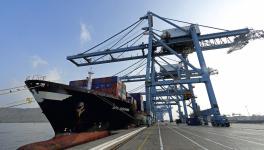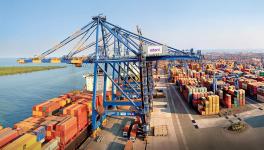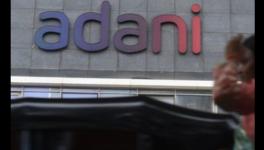Coal Over-Invoicing Scam: DRI Will Appeal Decision in Favour of Adani Group
On November 1, the Directorate of Revenue Intelligence (DRI), the investigative arm of India’s customs authorities, filed an affidavit before the Delhi High Court clarifying the status of its investigations into alleged over-invoicing of imports by a number of companies.
The imports – which included a range of capital goods and raw materials like coal that were brought into the country by companies operating in core infrastructure sectors, such as power generation and transmission, ports and fertilisers – have been under DRI’s scanner since the last six years.
The directorate has claimed that the costs of imports were deliberately and artificially inflated and thereafter, recovered from the public in the form of higher tariffs and user charges. The DRI has further alleged that a part of the undue profits thus earned, were stashed away in offshore tax havens.
The investigation that started in 2013 and expanded to include over 40 companies by 2016 is subdivided into many cases, most of which are still in various stages of investigation. In eight cases, the investigations have been concluded, and have proceeded to the stage of adjudication where the DRI must prove its charges before adjudicating authorities.
The DRI’s affidavit, filed by Kaushik T G, a deputy director at the DRI’s Mumbai zonal unit, is in response to a public interest litigation filed by the Delhi-based non-government organisation, the Centre for Public Interest Litigation.
The affidavit explains that the agency is still in the process of recovering material evidence, including details of bank accounts and documents relating to all the companies concerned in India and their subsidiaries and associates abroad, which were allegedly involved in over-invoicing. Towards this end, the DRI sought judicial assistance to retrieve information from six foreign countries – Singapore, Dubai, Hong Kong, Switzerland, Indonesia and the British Virgin Islands – by issuing Letters Rogatory (LRs) under Mutual Legal Assistance Treaties that the governments of these countries have with the Indian government.
An LR is a formal request for information issued by an Indian court on behalf of the country’s law-enforcing and investigative agencies to courts in foreign jurisdictions to facilitate the gathering of information on individuals and entities located outside India
The LRs issued in one investigation concerning coal imports from Indonesia by a company in the Adani group were quashed on October 17 by the Bombay High Court. As these authors had earlier explained, this decision threatens to undermine not only the DRI’s power to issue LRs under its standard procedure of investigation, but the powers of other investigative and law-enforcing agencies, such as the Enforcement Directorate, the Income Tax Department (both in the Finance Ministry) and the Serious Fraud Investigation Office (in the Ministry of Corporate Affairs.)
In our article, we had raised the question of whether the Department of Revenue in the Finance Ministry would appeal the verdict of the Bombay High Court before the Supreme Court. The DRI’s affidavit answers the question in the affirmative while summarising the sequence of events leading up to the Bombay High Court case, and states that it is in the process of examining the judgement.
The “Call Book”
The addifavit explains in detail an aspect of the internal procedures of the DRI that has not been brought before the public. It clarifies that the DRI maintains what is called a “call book” in which it records (1) cases where investigations have been completed, (2) cases that have reached a stage where no action could, or needed to, be taken to expedite their disposal for at least six months, and (3) cases that could be “transferred.”
In effect, by “transferring” a case file to the call book, it is placed “on hold” as such cases cannot be adjudicated upon immediately. This is usually on account of the fact that adjudications or appeals related to identical or similar cases are underway, and the fate of the cases moved to the call book would depend on the outcome of those adjudications or appeals.
Of the eight completed investigations, the DRI affidavit states that while three are undergoing adjudication or appeal, five have been transferred to the call book awaiting the outcome of the adjudication proceedings of the first three. We list each of these eight cases, beginning with the ones under adjudication.
Adani Power
Two power plants built by the Adani group – in Tiroda, Maharashtra and in Kawai, Rajasthan – are under the DRI’s scrutiny for alleged over invoicing of capital equipment used in power plants. The show cause notices (SCNs) issued in these cases in May 2014 were dismissed by the DRI’s adjudicating authority K V S Singh in August 2017 in a judgement that was examined in detail by Varun Santhosh in theafiles.in (published by one of the authors of this article), claiming that double standards had been applied. The DRI’s affidavit states that it has appealed the adjudication order before the Customs, Excise and Service Tax Appellate Tribunal (CESTAT) in which forum hearings are going on.
It is worth pointing out that in the cases of both these thermal power plants, allegations of over-invoicing imports of equipment as well as coal have been levelled by the DRI. While both the allegedly inflated cost of equipment and coal would be passed on to power consumers and the undue gains pocketed by the Adani group companies, in these two cases, a further benefit has gone the way of the corporate titan.
In May 2018, an order passed by the Rajasthan Electricity Regulatory Commission permitted a “compensatory tarriff” to be paid to the Adani group’s power plant in Kawai in that state, on account of an increase in the cost of imported coal due to a change in Indonesian laws, in an order examined earlier by these authors. The Maharashtra plant, too, has received similar relief from electricity regulators in the state.
Adani Transmission
In another case involving the Adani group, this time in its efforts to set up a transmission line from its power plant in Korba, the DRI has alleged that a wholly-owned subsidiary of the Adani group’s flagship company, Adani Enterprises Limited, over-invoiced capital goods imported for the construction of the trasmission line. The company involved, Maharashtra Eastern Grid Power Trasmission, and a contractor hired by it, PMC Projects (India), were issued SCNs in May 2014 as well, on the same day the SCNs were served on Adani Power.
In this case too, the same adjudication authority – K V S Singh – dismissed the DRI’s investigation in October 2017. This adjudication has also been challenged before the CESTAT by the DRI and hearings are going on.
Essar and Matix Projects
There are four other companies against whom similar allegations have been levelled by the DRI. These are Essar M.P. Limited, Essar Oil Limited, Essar Projects (India) Limited that are all in the Essar group of companies promoted by the Ruia family, and another company named Matix Fertilisers and Chemicals Limited.
The SCNs issued against these companies in 2015 have not been sent for adjudication as these are similar to the aforementioned cases involving Adani group companies. Specifically, the DRI states in its affidavit that the allegations against these companies include over-invoicing of captital equipment for the construction of a thermal power plant, a crude oil refinery as well as a plant for manufacturing urea fertilisers.
Knowledge Infrastructure Systems
The only case that has reached the stage where it has gone to the higher courts is the one relating to Knowledge Infrastructure Systems Private Limited, which was described by these authors as a “test case” in an article published in 2017 in the Caravan.
While, in this case, K V S Singh passed an adjudication order that was apparently contradictory to his own judgement in the cases relating to companies in the Adani group – upholding the DRI’s investigation that indicted KISPL for over-invoicing of imported Indonesian coal – the appellate body, CESTAT, dismissed the DRI’s charges.
In an unusual move, although the natural forum of appeal against a CESTAT order is the Supreme Court, the DRI chose to file its appeal before the Bombay High Court. The court rejected the petition on grounds of incorrect jurisdiction, suggesting that the appeal be filed before the Supreme Court.
The position taken by us authors stands vindicated following this affidavit. The DRI has acknowledged that in at least two instances, the KISPL case will function as a test case. These relate to Reliance Infrastructure Limited (in the Anil Dhirubhai Ambani group) and the Chennai-based Coastal Energy Private Limited. The final outcome in these cases depends on what happens to the DRI’s appeal before the Supreme Court
Adani Group Again
In addition to the case updates that were directly asked of the DRI in the lawsuit, the agency has included in its affidavit five related investigations that are underway against companies in the Adani group, Reliance Infrastucture and others. These entities include Adani Renewable Energy, Adani Enterprises Limited, Adani Hazira Port, Adani International Container Terminal, Adani Vizag Coal Terminal – which are accused by the DRI of having over-invoiced poor quality solar power manufacturing capital equipment. The SCNs have been moved into the call book on account of the KISPL case meandering its way to the country’s apex court.
Reliance Infrastructre and Rosa Power
Two cases pertaining to over-invoicing of coal imported from Indonesia are also in the call book pending adjudication, dependent on the outcome of the KISPL case in the Supreme Court. The DRI has alleged that Reliance Infrastructure and Rosa Power Supply Company Limited based in Shahjahanpur, Uttar Pradesh (which is also a part of the Anil Ambani group) together with Coastal Energy Private Limited over-valued coal imported from Indonesia and later recovered the amount through inflated electricity bills paid by electricity consumers.
Vadinar Power, Essar Power and Adani Power
Three cases involving these companies are in the DRI’s call book due to the pendency of the cases relating to Adani Transmission and Adani Power that are before the CESTAT. The three are, respectively, accused of over-invoicing (a) capital goods for a “captive co-generation plant” and for setting up a marine material handing facility, (b) capital goods for a thermal power plant, and (c) capital goods for setting up power generation plants in Maharasthra and Rajasthan, and also for setting up transmission lines.
Where Are All the DRI’s Cases Headed?
The DRI’s affidavit has brought a level of clarity to the over-invoicing investigations that had not been seen before. As the fate of several cases depends on the outcome of three cases, in two of which the DRI tasted defeat before the agency’s own adjudication authority, the reader should appreciate the precarious position of the entire investigation relating to over-invoicing of equipment and raw materials that allegedly involve an amount close to Rs 50,000 crore.
The DRI’s woes would be compounded if the Supreme Court fails to affirm the legality of the LRs issued to foreign juristictions in its investigation into over-invoicing of coal imports from Indonesia. If that happens, an entire range of cases, including practically all its over-invoicing cases, would have have run into a cul-de-sac. LRs have been issued in several cases, but the question remains as to whether the Supreme Court would uphold their legality.
If the apex court fails to confirm the legal validity of the LRs issued, this very instrument used to investigate the activities of foreign associates and affiliates of Indian corporate entitities would get delegitimised not just for the DRI but for other investigative and law-enforcing agencies in the country such as the Enforcement Directorate, the Serious Fraud Investigation Office and the Income Tax Department.
The authors are independent journalists.
Get the latest reports & analysis with people's perspective on Protests, movements & deep analytical videos, discussions of the current affairs in your Telegram app. Subscribe to NewsClick's Telegram channel & get Real-Time updates on stories, as they get published on our website.
























